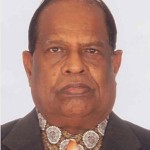The Continuing Political Ills Of Sri Lanka

By Thambu Kanagasabai –August 18, 2016
One can hardly deny the fact of various political ills plaguing and denting Sri Lanka’s image since 1956. A nation labelled as peaceful and prosperous until 1956 shed this image from then on to become a nation wracked with communalism, hegemony and ethnic strife promoted by power seeking politicians to score election victories with broken promises and a culture of impunity being the order of the day! If Sri Lankan powers that be, particularly the present regime, ideally situated to end the continuing conflict, won’t open its eyes, it’s time the international community recognises the urgency and puts pressure to force Sri Lanka into taking meaningful steps to break the logjam and bring a fair and just settlement.
[ 1 ] COMMUNALISM AND MAJORITY HEGEMONY
The Sinhala Only Act 1956 – it was not just a Sinhala Act but ‘Only Sinhala Act’ which effectively sealed the marginalisation and exclusion of the Tamil Language and by extension, Tamils. This piece of politically motivated and necessitated legislation heralded the polarisation and unbridled growth of Sinhalese nationalism allowing for the rise of Tamil nationalism and ethnic rift with extremists taking upper hand and exploiting the opportunities whipping up hatred and hostility between the two communities which have been hitherto living happily and socially mixing with no hidden feelings of fear or suspicion.
1956 was an important year which also thrust the Buddhist monks into politics and opened up a third front in the running of governments. The prescribed role of monks as advisors to rulers in times of need, preachers of Buddhism has now extended to full blown political activities including contesting elections to win seats while indulging in unsavoury political propaganda and even in violence like other die hard politicians. As a fall out, this act gave way to discrimination of Tamils in employment, appointments to state institutions, including recruitment in the security services.Even in education, this discrimination is continuing and universities functioning in the North and East which foster and preserve Tamil culture and traditions are now facing a policy of planned increasing of Sinhalese students in the universities in the North and East [Tamils traditional and historical homeland] creating tension and clashes as to who should have the right of decision in university functions and related matters.
These ills of marginalization, exclusion and discrimination have taken a heavy toll on the Tamils in all sectors of appointments and employments, like judiciary, security sector, public service, state institutions and banks etc. There is also no sign of any redemption or removal of this injustice and it appears almost irretrievable and entrenched.
Another ill is the detestable practices of favouritism, nepotism, and politicisation which have been continuing with common acceptance and even endorsing it as part and parcel of political lives in Sri Lanka. These malpractices always accompany persons holding political power particularly soon after they capture power. Their rule commences with appointments of family members, personal friends, loyalists and political stooges to top positions in state Institutions, Judiciary. Boards, Banks, Ministries and Missions abroad including Cabinet positions. Due to this unhealthy practice, efficiency, eligibility, merits and even seniority are discarded while opening the gates for abuse of power and position, bribery and corruption and even disregarding rules of procedure. A change in Government can only bring an end to this sad state of affairs while allowing a new front for above malpractices to resume. As an example, family members of former President Mahinda are facing investigations for bribery and corruption with an uncertain outcome.

